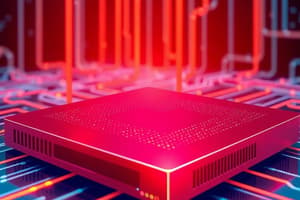Podcast
Questions and Answers
What is EDGE?
What is EDGE?
- A closer placement of resources that move, store, and process data (correct)
- A type of cloud computing
- A type of container architecture
- A type of software stack
What type of computing is Edge computing?
What type of computing is Edge computing?
- Cloud computing
- Network computing
- Distributed computing (correct)
- Local computing
What are some applications of Edge computing?
What are some applications of Edge computing?
- Robotics (correct)
- Asset management
- Video streaming
- Online gaming
What is required for EDGE-based container architectures?
What is required for EDGE-based container architectures?
What is an advantage of containerized EDGE applications?
What is an advantage of containerized EDGE applications?
What benefits does the cloud bring to EDGE-based applications?
What benefits does the cloud bring to EDGE-based applications?
What type of technology does Intel provide for EDGE containerization solutions?
What type of technology does Intel provide for EDGE containerization solutions?
What is a good example of modular functions?
What is a good example of modular functions?
What is an example of a hardware solution provided by Intel for EDGE containerization?
What is an example of a hardware solution provided by Intel for EDGE containerization?
What type of workflows can be used to deploy bios/firmware updates?
What type of workflows can be used to deploy bios/firmware updates?
What type of access control is used for source repositories?
What type of access control is used for source repositories?
What is the core software stack for application?
What is the core software stack for application?
What is the purpose of quality gates?
What is the purpose of quality gates?
What can be developed and deployed within the application itself?
What can be developed and deployed within the application itself?
What type of services can be layered as containerized services?
What type of services can be layered as containerized services?
Flashcards are hidden until you start studying
Study Notes
- EDGE refers to the closer placement of resources that move, store, and process data.
- EDGE compute devices have limited infrastructure capacity and capability, and can be challenging to secure.
- There are specific requirements for EDGE-based container architectures, including the need for an EDGE compute device and the application workload.
- The cloud brings many benefits to EDGE-based applications, including increased infrastructure capacity and bandwidth.
- EDGE compute devices are capable of running container-based applications
- CI/CD workflows can be used to deploy bios/firmware updates over the air
- Cloud-based CI/CD workflows make use of role-based access control for source repositories
- Policies can be used to implement quality gates to ensure container image integrity
- Cloud-based services can be used to monitor the state of a container and container clusters within each EDGE compute device
- The software stack for application includes a container runtime engine, container orchestration interface, and core services.
- Modular functions are beneficial for the software stack for application, and the EDGE compute solution is a good example of this.
- EDGE compute resources can be used in function-specific containers, and once core services for CPU, storage, and networking are built, other services can be layered as containerized services.
- Within the application itself, each component can be developed and deployed.
Studying That Suits You
Use AI to generate personalized quizzes and flashcards to suit your learning preferences.




